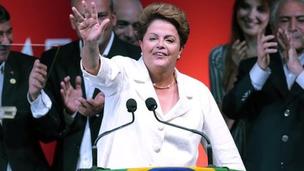Dilma Rousseff re-elected president of Brazil

Brazil’s leftist President Dilma Rousseff narrowly won re-election on Sunday after convincing voters that her party’s strong record of reducing poverty over the last 12 years was more important than a recent economic slump.
After one of the closest, most divisive campaigns in Brazil in decades, Rousseff won 51.64 percent of votes in a runoff against centrist opposition leader Aecio Neves, who won 48.36 percent with more than 99 percent of the votes tallied.
Rousseff said her first priority in a second term would be political reform, promising to work with Congress on changes that the country demands after winning re-election in a tight Sunday runoff.
Rousseff had called for a popular referendum on political reform after widespread protests in June 2013, but she dropped the issue in the face of stiff resistance from lawmakers.
In her victory speech, she also reiterated her commitment to fiscal discipline and controlling inflation.
Rousseff’s victory means another four years in power for the Workers’ Party, which since taking the reins of Latin America’s largest economy in 2003 has virtually transformed Brazil.
During that time, economic growth has lifted 40 million from poverty, reduced unemployment to record lows and made big inroads against hunger in what remains one of the world’s most unequal countries.
The party’s star has faded recently. The economy has slowed dramatically under Rousseff’s heavy-handed and often unpredictable policies, making Brazil’s glory days of robust growth last decade an ever-more distant memory.
Numerous corruption scandals, high inflation and frustration over poor public services like health care tempted many to consider a switch to Neves’ more pro-business agenda.
Source: France 24